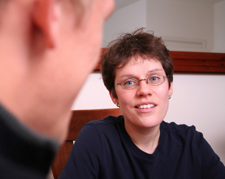 What does it take to be a Certified Diabetes Educator? Can anyone do it? What do they actually do? What is the role of the American Diabetes Association in the certification process?
What does it take to be a Certified Diabetes Educator? Can anyone do it? What do they actually do? What is the role of the American Diabetes Association in the certification process?
Before we get to the meat of the article, I will note that these men and women perform a critical role in helping people with diabetes adjust to their condition. Most doctors simply do not have the time to help answer many of the nuts and bolts questions that go along with taking care of your diabetes.
The old saying goes –“No man (or woman!) is an Island”. Well, no diabetic is an island either. For this reason, you should strongly consider working with an educator. Even grizzled diabetes veterans can learn something new about how to manage their blood sugar better. However, for the initiated, what is an educator and how do they help?
What is a CDE?
These are people who have a specialized knowledge of diabetes care and who work with diabetics to cope with the disease and better manage it. Educators are usually already licensed in a health care field, typically as a nurse, doctor, dietician, pharmacist, etc. An educator is just one part of your health care team which includes your primary physician, specialist (e.g., optometrist), and your support network (friends and family).
Are All Educators Created Equal?
 Well,…no. Essentially, most anyone in the health care field can promote themselves as a diabetes educator. However, you should look at their credentials. There are two main organizations or associations that educate and certify health care professionals for diabetes care.
Well,…no. Essentially, most anyone in the health care field can promote themselves as a diabetes educator. However, you should look at their credentials. There are two main organizations or associations that educate and certify health care professionals for diabetes care.
One is the National Certification Board for Diabetes Educators (NCBDE). The NCBDE is a very stringent group. It is not a trade or membership group. The Board is responsible for developing, maintaining and administering the Certified Diabetes Educator (CDE) credential. The CDE is the “certification of all diabetes certifications.”
There are strict eligibility requirements, including the amount of time spent working on diabetes self education. Also, all CDE’s must pass a national examination. It is designed for medical professionals who have a primary role in diabetes self education, not someone who merely touches upon some aspects of diabetes care as part of their duties. They are a very serious group (a little intimidating, in a good way!). You can check out the NCBDE website here.
The Second group offering educator certification is the American Nurses Association (ANA). Their program is called Board Certified – Advanced Diabetes Management (BC-ADM). To be eligible, you must be a clinical nurse specialist, nurse practitioner, registered dietician or registered pharmacist. Additional screening is done regarding the person’s education, job duties, etc. There is also a national certification exam.
There is a third group, the American Association of Diabetes Educators (AADE), you should also be aware of that does not do its own certification program. Unlike the NCBDE and ANA, who offer very strict certification programs, the AADE is a membership or trade group open to a wide range of people in the medical field. There are no real membership eligibility requirements.
However, this doesn’t mean that it is a totally worthless group when it comes to education about diabetes. They offer general member training and education opportunities and trade shows, just like any other trade group. However, if someone touts membership in the AADE as instilling specialized skill or knowledge similar to a certification program), you may want to think twice about working with them.
This is not to say that all educators need to be certified by the either the ANA or the NCBDE to be good or helpful in your care. In fact, many competent educators are not certified by either of these two groups.
What Does a CDE do?
The exact educator philosophy may vary, however, the AADE does offer a good user friendly set of guidelines. The focus of an educator is to help YOU better manage your diabetes. This does not mean you handle it all on your own, but simply means that you need to learn how to take charge of your treatment. They are there to help you do this.
The core focus is on seven areas.
| Healthy Eating | Being Active |
| Blood Sugar Monitoring | Taking Medication |
| Problem Solving | Reducing Risks |
| Healthy Coping |
The AADE has a nice brochure on how the seven core behaviors work. The brochure can be found here.
Summary
 Hopefully, the above will allow you to choose and evaluate your educator better. Another goal is to help you understand how the educator fits into your care. Ultimately, no one is responsible for your care but you. No one is going to do it for you.
Hopefully, the above will allow you to choose and evaluate your educator better. Another goal is to help you understand how the educator fits into your care. Ultimately, no one is responsible for your care but you. No one is going to do it for you.
One last thing. Make sure you interview your diabetes educator to make sure you are a fit from a personality stand point. All the credentials in the world won’t help the process if you don’t get along with the person.
By Erich Schultz – Last Reviewed January 2013
